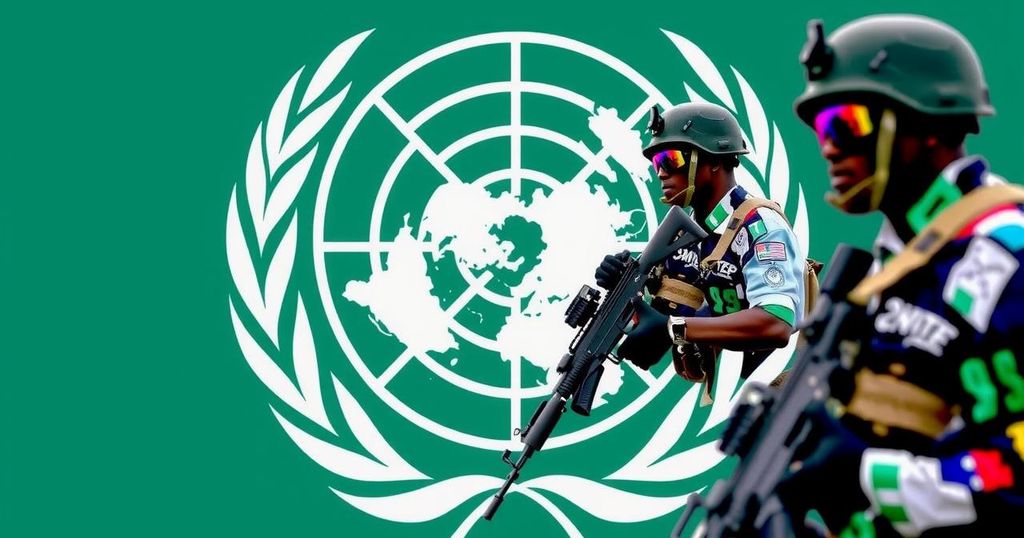Congo’s Dilemma: The Future of UN Peacekeepers Amidst Renewed Violence

The Democratic Republic of Congo is experiencing heightened violence from rebel groups, particularly the Rwandan-backed M23, leading to calls for the withdrawal of U.N. peacekeepers (MONUSCO) even as security issues persist. Local communities express frustration with the efficacy of the peacekeeping mission, while the government seeks stability in its mineral-rich eastern regions. The situation remains precarious for civilians, with possible consequences of the U.N. withdrawal posing significant risks of increased conflict and humanitarian crises.
The situation in the Democratic Republic of Congo (DRC) is complex, marked by increasing calls from the Congolese government to remove United Nations (U.N.) peacekeepers, despite a prevailing climate of violence and insecurity fueled by Rwandan-backed rebel groups. The UN peacekeeping mission, known as MONUSCO, was originally scheduled to withdraw by December, but escalating attacks in eastern Congo have necessitated its extended presence. The region is plagued by armed militias, the most prominent being the M23, which has received external support, exacerbating the already dire humanitarian situation for millions of displaced civilians. While the Congolese government expresses a desire for the peacekeepers to exit, local communities exhibit significant frustration towards MONUSCO, often viewing it as ineffective amidst recurrent violence. Recent interactions have highlighted the precariousness of peacekeeping efforts in a land of abundant minerals, such as cobalt and tantalum, where global interests significantly complicate local security issues. The DRC, being the largest producer of cobalt essential for modern technologies, finds itself at the center of a troubling nexus of conflict, exploitation, and international interests. Displaced persons, militia groups, and UN forces represent a landscape where security is tenuous. As local authorities and the international community grapple with the implications of potential UN withdrawal, the threat of a severe security vacuum looms large, particularly given that over 80% of the DRC’s internally displaced population resides in U.N.-protected areas. This precarious balance intensifies concerns over the impact on civilians if MONUSCO departs without a robust security strategy in place. As the DRC struggles to assert control over its eastern regions, the intersection of mineral wealth, foreign intervention, and local conflict remains a significant barrier to achieving lasting peace. With the international community cautioning against a hasty withdrawal of the U.N. forces, the quest for stability in Congo remains fraught with challenges that threaten to engulf the region in further turmoil.
The Democratic Republic of Congo has been embroiled in conflict for decades, particularly in its mineral-rich eastern provinces. This conflict often has external dimensions, with neighboring countries, particularly Rwanda, involved either directly or indirectly. The United Nations deployed peacekeepers in response to the ongoing violence, tasked with stabilizing the region and protecting civilians. Recently, however, the Congolese government has requested the UN mission, known as MONUSCO, to prepare for withdrawal. As the timeline for this departure looms, the security situation remains precarious, with armed rebel groups, including the M23, conducting operations backed by external forces. The DRC possesses substantial natural resources, which adds a layer of complexity to the conflict as global interests in these minerals continue to influence local dynamics.
The call for the withdrawal of U.N. peacekeepers from the Democratic Republic of Congo arises from a turbulent interplay of local frustrations, government desires for autonomy, and an alarming security environment characterized by rampant militia activities. As the international community weighs the implications of such a departure, the pressing need for a nuanced strategy to safeguard civilian populations and stabilize the region becomes increasingly evident. Without a comprehensive plan, the potential pullout of MONUSCO could lead to escalated violence, further displacing vulnerable communities and complicating an already fraught situation.
Original Source: apnews.com







